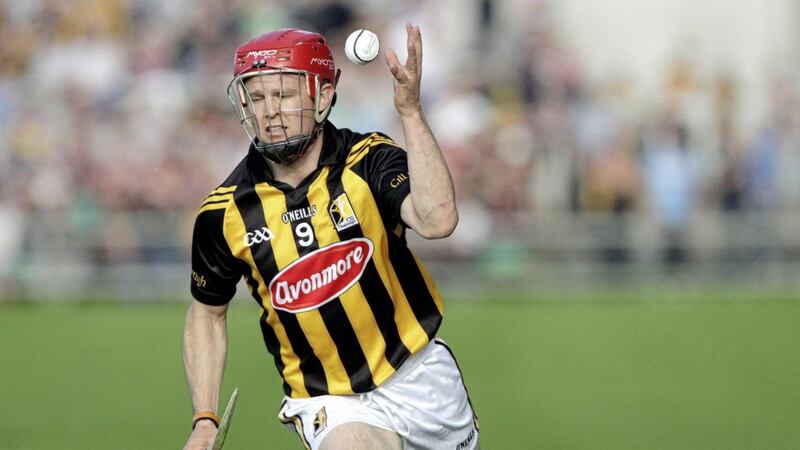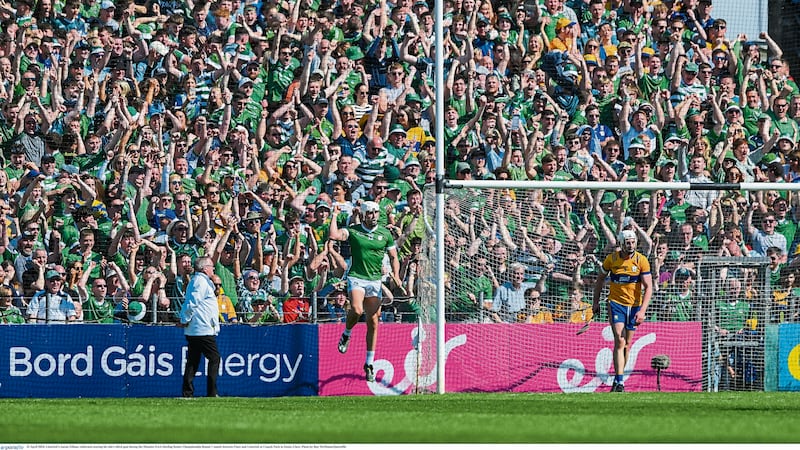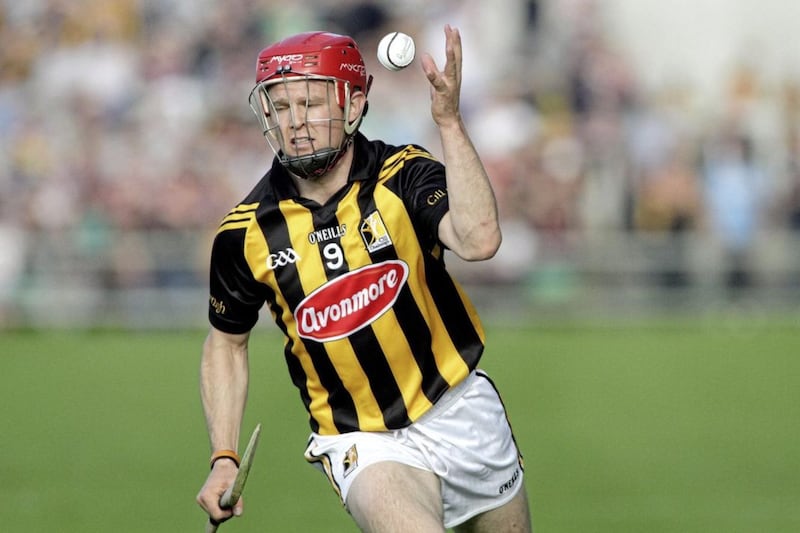When hurling’s 'Team of the Millennium' was selected in 2000, Brian Whelehan was the only current player to be named.
At the end of that season, Whelehan was coming off the field after Kilkenny had hammered Offaly in the All-Ireland final and a Kilkenny supporter lambasted the Offaly man for being picked on the team.
“I was fit to hit him,” Whelehan recalled years later. “He was probably hinting at the fact that DJ (Carey) wasn’t on the team.”
It was an extraordinary coincidence that Carey and Whelehan should make their first start in the senior championship on the same day in 1990, one marking the other.
Offaly were brilliant that day and Carey was taken off before half-time, scoreless. They both became superstars, but the ‘Team of the Millennium’ selectors only had room for one of them.
Not everyone was going to agree with the final 15. How could they?
Every All-Star selection is tangled up with opinion and assertion. If it was an exact science, there wouldn’t be any arguments.
A team of the greatest players ever though, has a far higher value.
It would always generate much more heated debate.
Yet if that team was picked now, how many players of the modern era would make it?
It’s not illogical to assume that at least four would be nailed on.
Any process that attempts to stake those claims is unavoidably subjective and contentious.
But the greatest team of all time, Brian Cody’s Kilkenny, and their three stand-out Hall of Fame players, are fully deserving of inclusion.
The greatest goalkeeper of the modern era has also earned the right to be selected.
So has the player with the most championship appearances in hurling history.
And just like Whelehan and Carey, the hurling community were fortunate that all five – who retired in the last decade – came along at the same time.
Brendan Cummins (Tipperary)
All-Irelands – 2
All-Stars – 5
Championship appearances (hurling) – 73 (16 in football)
Retired - 2013
Cummins’ excellence was such a continuum that his saves just bled into each other.
His performance against Kilkenny in the 2003 All-Ireland semi-final is always the most vivid reference point for epic Cummins saves.
Yet, his monumental display against Kilkenny in the 2006 league was vastly more impressive and, technically far superior.
In a golden age for goalkeepers, Cummins was the greatest, and probably the best ever.
Some historians, connoisseurs and romantics may disagree but, how could they?
Cummins was not a natural talent or stylist but in terms of shot-stopping, handling, bravery, physical presence, striking and pin-point accuracy, Wexford’s Damien Fitzhenry and Kilkenny’s Eoin Murphy are the only other goalkeepers who had that rich amalgam of talent.
Lack of old TV footage denies any true comparison between generations. Yet, apart from Fitzhenry, Murphy and Davy Fitzgerald, no other keeper made as many point-blank, reaction and bullet saves as Cummins.
The best way to judge a keeper is often by the number of errors that span a career. In 73 championship appearances, Cummins conceded 89 goals. Forensically examining those 89 goals, only one of those - on his debut against Waterford in 1995 - could be considered a poor goalkeeping error.
The evolution of his striking showed how he could adapt but Cummins’ greatest legacy was how his bravery radically altered the nature of modern shot-stopping.
JJ Delaney (Kilkenny)
All-Irelands – 9
All-Stars – 7
Championship appearances - 66
Retired – 2014
When TG4 recently screened an old Laochra Gael episode on Delaney, one line from his former team-mate Michael Rice stood out: “I can’t recall JJ ever playing a bad game.”
There was only one occasion when Delaney was ever cleaned out – against Galway in the 2007 All-Ireland quarter-final. Yet Delaney was just back from a cruciate knee injury.
Critics could point to the 2011 Leinster semi-final against Wexford, but Delaney went into that match with a hamstring injury. They could also finger Delaney for the five points from play he conceded to Seamus Callanan in the drawn 2014 All-Ireland final. But Delaney still made a lot of important plays that afternoon.
Delaney was one of the best all-round defenders the game has ever seen; stylish, classy, versatile, intelligent, a leech-like man-marker, a python under the dropping ball. More importantly, Kilkenny were always able to depend on him.
Along with James ‘Cha’ Fitzpatrick, Delaney was the only other player Cody promoted straight from minor. Back in 2006, Cody – a man never given to overstatement – said: “I have never seen a better defender than JJ Delaney. Never, ever.”
And Delaney was only 24 by then. Enough said.
Tommy Walsh (Kilkenny)
All-Irelands – 8
All-Stars - 9
Retired – 2014
After last year’s Kilkenny Intermediate county final, Tommy Walsh gave a brilliant radio interview to Nicky Brennan, former GAA President. Tullaroan had lost the previous year’s final and Walsh said that he and his team-mates were “going to die to win a county title”.
Tullaroan went on to win the All-Ireland but that sentiment expressed after the county final was a metaphor for how Walsh played the game.
Walsh’s constant refusal to back off or back down was his calling card.
He played every training match in Nowlan Park like it was an All-Ireland final. Even though he was the smallest man on a team of huge physical enforcers, Walsh’s size never mattered.
He was imperious in the air, but his constant brilliance and versatility set him apart.
He established himself as one of the greatest wing-backs in history but in his 55 championship appearances for Kilkenny Walsh started in six different positions, from corner-back to wing-forward to centre-field.
He scored 1-37 in championship hurling even though only ten of his championship appearances were outside the defence.
One of the greatest all-round talents the game has ever seen.
Michael ‘Brick’ Walsh (Waterford)
All-Irelands – 0
All-Stars – 4
Championship appearances – 76
Retired – 2019
One of the saddest sights in last year’s championship was the manner in how Michael ‘Brick’ Walsh finally bowed out.
As Cork were annihilating Waterford, Walsh was introduced in the 64th minute for his 76th and final championship match.
After the 2017 All-Ireland final, Derek McGrath described Walsh as the “the best team player that’s ever played for Waterford”.
After Walsh retired, Kevin Moran said he was the “greatest player Waterford has ever produced”.
Few would dispute those claims.
In Waterford’s modern history, the county has produced some brilliant players, some of the most talented and skillful hurlers, and standout personalities, to ever play the game.
Walsh would never be categorised in the same bracket for skill, or mercurial talent, or the exuberance of his personality on the pitch, but his value to Waterford almost granted him even greater cult status than Paul Flynn, Dan Shanahan, John Mullane, Ken McGrath and Tony Browne.
Walsh almost broke every record imaginable for durability and adaptability; his first 74 championship appearances were consecutive; he played championship in eight different positions;
Walsh won his four All-Stars in three different positions; he has ten Waterford senior football medals with Stradbally; Walsh was Waterford captain for three different stints.
Walsh would struggle to make anyone’s ‘Greatest’ team of hurlers, but he at least deserves a place in the conversation. He holds the record for most championship appearances, but numbers could never do full justice to a glorious career that just kept on giving.
Henry Shefflin (Kilkenny)
All-Irelands – 10
All-Stars – 11
Championship appearances – 71
Retired – 2015
On the night Henry Shefflin launched his autobiography in 2015, Brian Cody’s eulogy lasted 15 minutes, but one line effectively summed up Shefflin’s career. “Henry got the very best out of himself,” said Cody, “and he couldn’t have got any more.”
Shefflin has always absolutely maximised his talents. When he retired from Ballyhale Shamrocks, the club were mired in such mediocrity that Shefflin took over as manager to try and turn the ship around; he steered Ballyhale to successive All-Ireland club titles in 2019 and 2020.
Shefflin’s hurling career has been one long standing ovation because he transcended the game. Even since his retirement, Shefflin has long existed in the national imagination as hurling’s most visible face.
He penetrated parts of the national consciousness unreachable to most GAA players.
All the numbers confirm his greatness; ten All-Ireland senior medals, 11 All-Stars, the highest scorer in championship history with 28-485.
He embodied everything Cody stood for but Shefflin was also the ultimate modern player. He hunted every edge to improve but he was still always guided by the traditional virtues of humility and constant self-improvement.
Shefflin’s immense legacy and greatness is endless.


